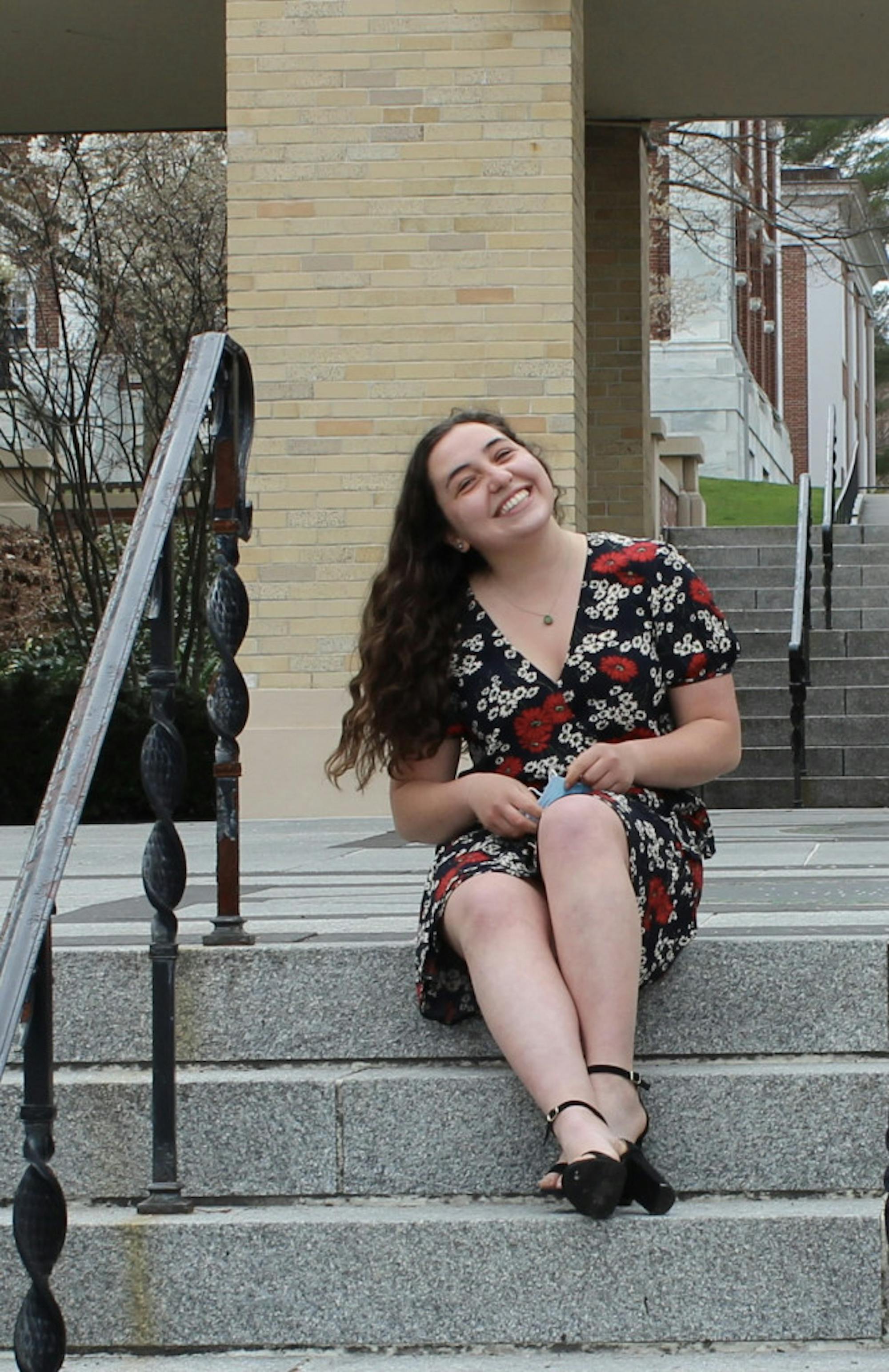To say that Sarah Wiener was busy during her time at Tufts would be an understatement. Throughout her four years here, Wiener has become the Tufts Community Union president and a Tufts Wilderness Orientation leader, started a swim group, given campus tours, taught an Experimental College class and double majored in philosophy and political science, with a minor in colonial studies.
Before juggling all those activities, the Denver native had to choose a school. As a tour guide, Wiener has her "Why Tufts?" story down pat. Her story begins at a Tufts information session, where a speaker told the story of two Tufts computer science majors with odd minors who became millionaires overnight.
“They designed an app and sold it in a short amount of time their senior year, and they didn’t tell any of their professors or friends because they were all so stressed about the future and their jobs, and they told some of their friends after graduation,” Wiener said. “I remember thinking that I want to grow up being as kind and considerate as that.”
Ultimately, her reason for coming to Tufts was part a gut decision and realization that its students were genuinely kind and humble.
On campus, Wiener is most prominently known as the president of the TCU Senate, an organization she became involved with during her first year at Tufts. During her sophomore year, she was the chair of the Administration and Policy Committee, organizing town halls between the student body and Tufts administration leaders, such as University President Anthony Monaco and the Vice President of Finance and Treasurer James Hurley. This gave students the opportunity to ask budgetary questions. By senior year, she decided to run for president.
“I like to think of [being president] as being a basket under Senate and there are a million balls in the air, and whenever someone drops it, you’re there to catch it,” Wiener said.
Outside of TCU Senate, Wiener has been on a three-year journey to get her swim group approved as an official club sport. Having walked onto the varsity swim team during her freshman year and having been promptly cut by sophomore season, Wiener and her friend developed a club out of their hour-long self-run swim practices. Despite the group being denied official recognition, she and her friend continue to organize practices and socially-distanced exercises through a group chat.
The convergence of all her interests manifests themselves physically at the Mayer Campus Center.
“I’m getting teary-eyed,” Wiener said. “Anyone who knows me knows that I spend all my time in the Campus Center; whenever I'm not home, that’s where I am.”
According to Wiener, it’s where she sees her friends and acquaintances — from her swimming group, Senate or classes.
“I love seeing people do the things that they’re passionate about," Wiener said. "I love walking by the info booth and speaking to my friends there and just feeling immersed in the community.”
Just like in her extracurriculars, Wiener has a full academic plate. Wiener said that one of the biggest impacts from her childhood was switching from her small, private middle school to her district high school.
“[I saw] the disparity of going to middle school where everyone looked and talked like me and then going to high school and understanding the privilege ... [and] that people come from different socioeconomic racial-ethnic backgrounds,” Wiener said.
To narrow her courses down to a favorite one would be a difficult feat for Wiener. However, one of her favorite classes was Race and America with professor Jean Wu.
“That was the first time I was academically exposed to critical race theory, but also given the space to think critically about the institutions that I am complacent in, active in or just involved in,” Wiener said. “It was the first time I looked around Tufts and thought what are the things we do here just because they’re comfortable and normal and institutionalized but are still unjust?”
The class also taught her words such as "microaggression" and "power asymmetry" to identify unjust behavior, and promoted her interest in the colonial studies minor and becoming a leader in the community.
Another class that had a profound impact on her was Political Philosophy of Martin Luther King Junior with professor Erin Kelly, a professor who she admires: “I want my brain to work like hers.”
The course prompted Wiener to pose thought-provoking questions.
“Everything is about in my view our relationship with law, government and institutions, and when that’s unjust ... how do you make sense of it?" Wiener said. "How is there ever a just law? Is hope ever rational?”
With these questions in mind, Weiner has also taught an ExCollege class called “The Elephant in the Room: Situating Ourselves at Tufts and in Higher Education” with Jill Impastato, about responsible community membership for first-years through critically studying historical and modern patterns of admissions, finances, pedagogy, curricula and student activism at Tufts and in higher education.
In the longer run, Wiener said that she is interested in working in public policy. Last year, she was studying for her LSATs, but her plans for law school were interrupted when she was hit by a car and got concussed.
“Obviously there are many bad things about a car accident, but it really made me reassess what I wanted to do next and give myself more options than I had considered,” she said.
Weiner is currently exploring opportunities with NGOs, think tanks and congressional offices.
When it comes to describing her experience at Tufts, Wiener narrows it down to five words: “Resilience. Community. Humility. Shakers. Laughing.”






